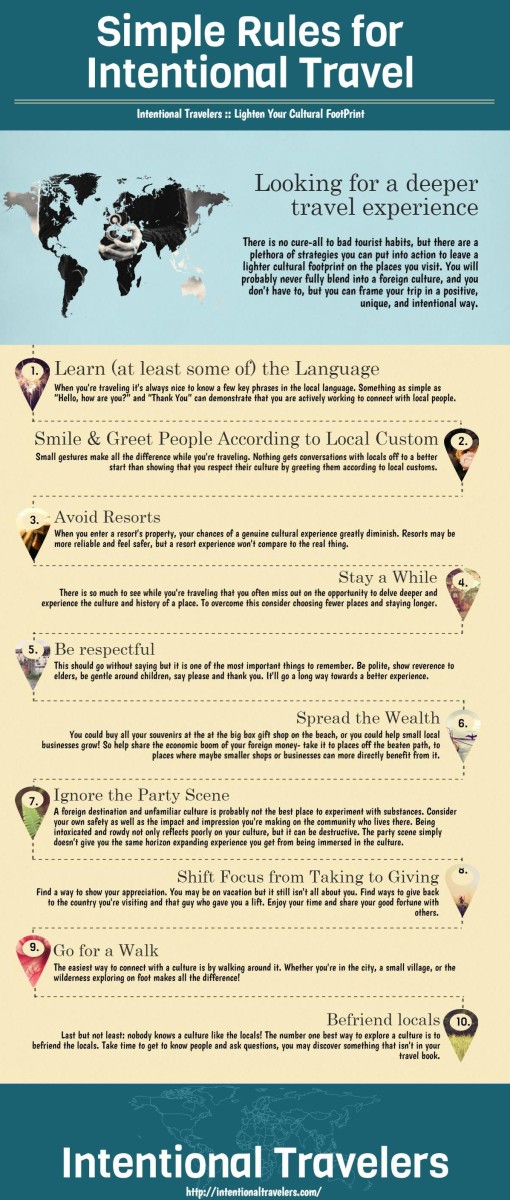Traveling to a foreign land is an adventure like no other. It allows you to immerse yourself in different cultures, taste new cuisines, and learn about people from all walks of life. However, with this excitement comes the responsibility of respecting the customs and traditions of the places you visit. Cultural etiquette is key in ensuring a positive and meaningful travel experience, both for you and the locals. In this blog post, I will share some tips for being respectful when traveling abroad, based on my own personal experiences.
1. Do your homework: Before embarking on your journey, take some time to research the customs and etiquette of the country you’re visiting. Understanding the local culture will help you avoid inadvertently offending anyone. Learn about greetings, gestures, and dress codes, as these vary greatly from one place to another. For example, in some cultures, it is customary to remove your shoes before entering someone’s home, while in others, it is considered disrespectful to show the soles of your feet.
2. Dress appropriately: Your choice of attire can send a strong message to the locals. It’s important to dress in a manner that shows respect for the cultural norms. In conservative countries, such as those in the Middle East or certain parts of Asia, it’s best to dress modestly and avoid revealing clothing. By doing so, you not only demonstrate respect for local values but also avoid unnecessary attention or discomfort.
3. Learn basic phrases: While English may be widely spoken in many tourist destinations, making an effort to learn a few basic phrases in the local language can go a long way. Simple greetings like “hello,” “please,” and “thank you” can create a connection and show your respect for the local culture. Locals will appreciate your efforts, even if your pronunciation isn’t perfect.
4. Respect religious practices: Many countries have deeply rooted religious beliefs and practices that should be respected. When visiting religious sites, dress appropriately, remove your shoes if required, and follow any rules or restrictions in place. Be mindful of your behavior and avoid disrespectful actions or gestures. Remember, you are a guest in someone else’s sacred space.
5. Observe social customs: Different cultures have their own social customs and norms that may differ from what you’re used to. For example, in some countries, it is customary to greet someone with a kiss on the cheek or a bow, while in others, a handshake is the standard greeting. Observing and adapting to these customs shows your respect and willingness to embrace the local way of life.
6. Mind your table manners: Food is an essential part of any culture, and dining etiquette can vary significantly. Take the time to familiarize yourself with the local customs regarding dining. For example, in some cultures, it is rude to start eating before everyone else is served, while in others, burping after a meal signifies satisfaction. By being mindful of your table manners, you can show respect for the local culinary traditions and avoid any unintended faux pas.
7. Be aware of body language: Body language can be culturally nuanced, and what may seem like harmless gestures in your own culture could be offensive in another. For example, in some Asian countries, direct eye contact can be seen as a sign of disrespect, while in Western cultures, it’s a sign of engagement. Understanding these subtle differences can prevent misunderstandings and enhance your interactions with locals.
8. Keep an open mind: One of the most valuable aspects of traveling is the opportunity to learn and grow. Keep an open mind and be accepting of cultural differences. Be willing to engage in conversation, ask questions, and listen attentively. By approaching each interaction with curiosity and respect, you’ll not only create memorable connections but also gain a deeper understanding of the world around you.
In conclusion, cultural etiquette is a vital aspect of respectful travel. By doing your homework, dressing appropriately, learning basic phrases, respecting religious practices, observing social customs, minding your table manners, being aware of body language, and keeping an open mind, you can ensure a positive and enriching travel experience for both yourself and the locals you encounter. So, pack your bags, embrace new cultures, and embark on your next adventure with the utmost respect and curiosity. Happy travels!




